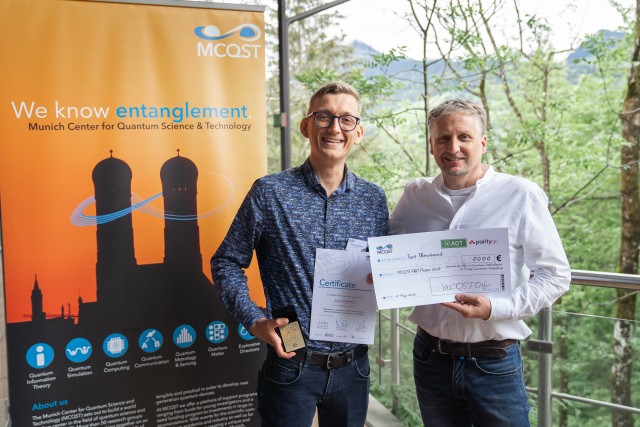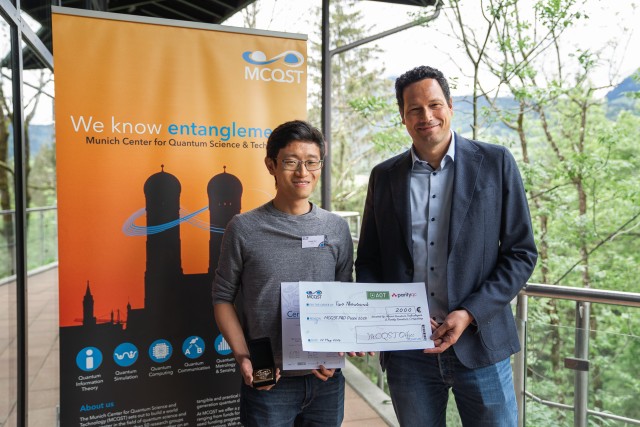12 June 2024
Arthur Christianen and David Wei win the MCQST PhD Awards 2023
The MCQST PhD Award honors the best PhD theses in quantum science and technology selected from the MCQST community. The prize highlights and recognizes excellence in research at an early career stage, and aims to encourage awardees to pursue a future career in science. MCQST considers outstanding theses in the field of quantum science and technology (grade: summa cum laude) from the disciplines of physics, mathematics, computer science, electrical engineering, material science, and chemistry from both, LMU and TUM.
From the submitted theses, the jury selected and awarded two outstanding works in 20223: "Chemistry in a quantum medium" by Arthur Christianen (MPQ) and "Microscopy of spin hydrodynamics and cooperative light scattering in atomic Hubbard systems”" by David Wei (LMU Munich). Alongside the recognition of their excellent scientific work and contribution to the MCQST scientific community, the award consist of €2000 each, generously donated by AQT and ParityQC.
The award ceremony took place during the Munich Conference on Quantum Science and Technology 2024 in Sonthofen on Friday, 17 May.
 © C. Hohmann / MCQST
© C. Hohmann / MCQST Arthur Christianen
Chemistry in a quantum medium
MPQ & TUM | Advisor: Prof. Ignacio Cirac
It is well known in chemistry that chemical reactions are strongly affected by their surrounding medium, but what happens if that medium is quantum degenerate? In his thesis, Arthur theoretically explored the model system of an impurity atom immersed in a Bose-Einstein condensate (BEC) of ultracold atoms. On the one hand, the BEC acts as a “quantum solvent” by dressing the impurity to form a quasiparticle called the Bose polaron. On the other hand, the impurity can form molecular states with particles from the BEC. Arthur showed how the combination of these effects can lead to exotic phenomena, such as many-body shifted scattering resonances and superpositions of molecules with different particle numbers. In further work, he investigated chemical reactions of ultracold molecules and novel algorithms for near-term quantum computers.
"It has been a great pleasure for me to pursue my PhD in the excellent scientific environment of the Max Planck Institute of Quantum Optics and the MCQST. I have always been impressed by the quality of all the research done in the MCQST, and I therefore feel deeply honored to be recognized with this PhD award."
 © C. Hohmann / MCQST
© C. Hohmann / MCQST David Wei
Microscopy of spin hydrodynamics and cooperative light scattering in atomic Hubbard systems
MPQ & LMU | Advisor: Prof. Immanuel Bloch
Ultracold atoms in optical lattices have enabled the experimental study of a wide range of quantum many-body phenomena. These can range from problems originating in condensed matter physics to quantum optics, both of which David had the opportunity to work on during his PhD. In particular, by advancing the lattice systems and local control of a quantum gas microscope, he could study the anomalous hydrodynamics and full counting statistics arising in the spin transport of the 1D Heisenberg model, as well as characterize nonlocal order present in 2D Mott insulators. In addition, using atoms trapped in a subwavelength-spaced optical lattice, David could observe subradiance in extended arrays of atomic dipoles resulting from cooperative light scattering.
"Progressing on complex experiments relies on an inspiring and supportive environment, so I am particularly grateful for being part of the Munich quantum community and honoured with the MCQST PhD Award."
Congratulations to Arthur and David, and all the best for their future!
